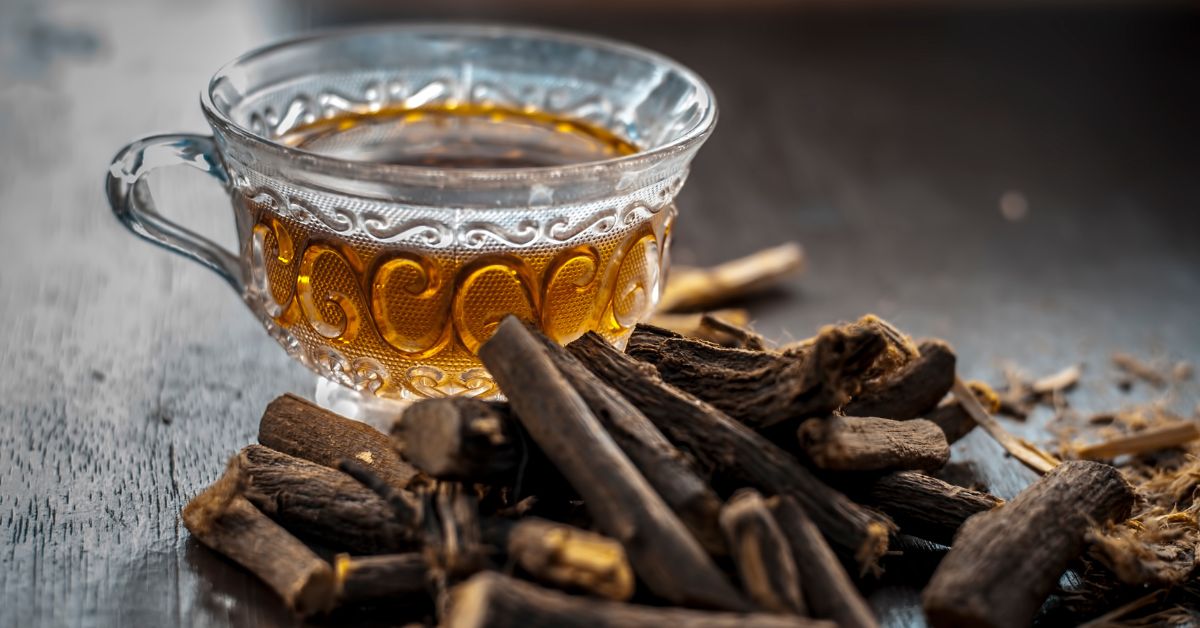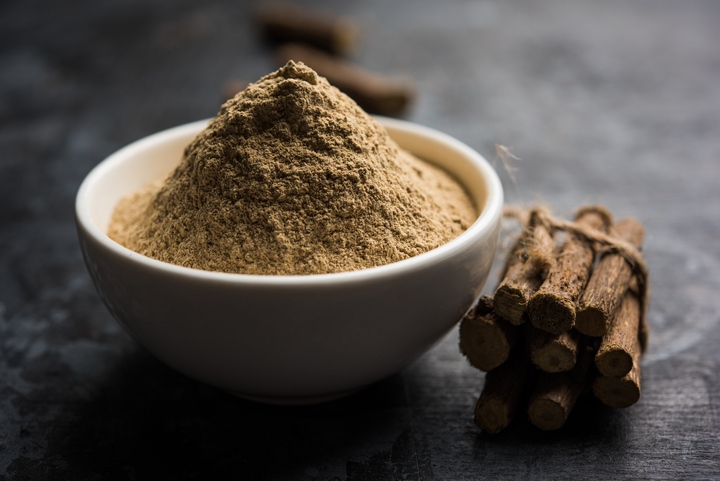Science Behind What Makes Grandma’s Mulethi Tea the Perfect Winter Drink
From boosting immunity to improving oral health, mulethi or liquorice root offers a plethora of health benefits. Here’s why science says you must include it in your winter diet.

Winter is here, and one cannot be prepared enough to avoid health issues that commonly arise during this time. Fortunately, be it cold, cough or gastric issues, there are always traditional home remedies to tackle most seasonal discomforts.
Traditional spices and herbs, such as turmeric, pepper, ginger and tulsi, are some of the most common ingredients, readily available in an Indian kitchen. Other than being used to make our food flavourful, these ingredients also hold many medicinal benefits that can come in handy this cold season.
One such ingredient is the mulethi or liquorice root — a herb that is known for its health-boosting properties. Not a very common kitchen ingredient, but often considered a superfood, the herb has been an integral part of Ayurveda and Chinese medicine. So, it’s highly recommended to include this herb in our kitchens.
Native to Southern Europe and Western Asia, mulethi is a perennial root that is naturally sweet in taste. Hence, it is mostly used as a flavouring agent in food, candies, tobacco, and so on. According to studies, it is the presence of a chemical constituent named glycyrrhizin that lends this herb its sweet taste, as well as its anti-inflammatory, antioxidant, and antimicrobial properties.
So, including mulethi in our winter diet would cater to different aspects of our health. Though it is available in extracted, dried, and powdered forms, one of the best ways to consume it is by making herbal tea.
While sipping hot beverages such as tea and coffee is tempting during winter, you can add healthy mulethi tea to the mix for its health benefits. Here are some of the benefits:
- Relief from cough and cold
Mulethi is hailed for its property of curing common colds, coughs, sore throats, and other respiratory discomforts and infections that usually occur during winter. Daily consumption of mulethi tea also helps with asthma-related symptoms as it has bronchodilating properties.
- Boosts immunity
There are several enzymes present in mulethi that generate white blood cells such as macrophages and lymphocytes. These cells help in protecting the body by fighting microbes, allergens, pollutants and auto-immune diseases, thereby boosting immunity.
- Improves digestion
The cold season could also upset one’s digestion process resulting in conditions like constipation, indigestion, acidity and heartburn. Including this liquorice root in the diet can bring relief to these gastrointestinal issues. Studies say the presence of two active compounds — glycyrrhizin and carbenoxolone in the roots works as a mild laxative. This helps in stimulating proper bowel movements while providing relief to the stomach.

- Reduces menstrual cramps and menopause symptoms
There are studies that point out the effect of liquorice in alleviating cramps during menstrual periods in women. Besides, studies suggest that the anti-inflammatory properties of the herb are effective in reducing menopause symptoms like hot flashes, insomnia and mood swings in women.
- Provides relief from anti-inflammatory diseases
Mulethi’s properties help in treating or finding relief from inflammatory diseases like arthritis and liver and kidney-related diseases. Besides, the anti-inflammatory and antiapoptotic properties of glycyrrhetinic acid in the herb help to protect liver health.
- Improves oral health
It is also an ingredient with effective antimicrobial properties that helps in maintaining good oral health. The liquorice root extract has the ability to protect teeth from bacteria that cause cavities, tooth decay and swollen gums.
- Reduces bad cholesterol
The antioxidants present in mulethi help in dilating blood vessels, thereby avoiding fat buildup in arteries and veins. Besides liquorice has pancreatic lipase inhibitory activity that helps to lower triglycerides, total cholesterol and LDL cholesterol.
Here’s a recipe to make the mulethi tea, packed with healthy benefits:
Ingredients:
- Two cups of water
- One teaspoon of mulethi powder
- A half-inch of ginger root
- A half teaspoon of pepper powder
- Tea leaves
- A half teaspoon of honey
How to make:
- Take water in a pan.
- Add mulethi, ginger and black pepper powder, and let it boil.
- Add tea leaves and let them boil for a few more minutes.
- Turn off the flame and strain the tea.
- Add honey as per taste and stir.
Edited by Pranita Bhat
Sources:
The antiviral and antimicrobial activities of licorice, a widely-used Chinese herb, published by National Centre for Biotechnology Information on 17 June 2015.
Glycyrrhizin and Long-Term Histopathologic Changes in a Murine Model of Asthma, published by National Centre for Biotechnology Information in December 2011.
The synergistic anti-asthmatic effects of glycyrrhizin and salbutamol, published by National Centre for Biotechnology Information on April 2010.
The immunomodulatory activities of licorice polysaccharides (Glycyrrhiza uralensis Fisch.) in CT 26 tumor-bearing mice, published by National Centre for Biotechnology Information 15 December 2017.
An Extract of Glycyrrhiza glabra (GutGard) Alleviates Symptoms of Functional Dyspepsia: A Randomized, Double-Blind, Placebo-Controlled Study, published by National Centre for Biotechnology Information on 16 June 2011.
The effect of Glycyrrhiza glabra L. on Primary Dysmenorrhea compared with Ibuprofen: A Randomized, Triple-Blind Controlled Trial, published by National Centre for Biotechnology Information in 2019.
Effects of Licorice on Relief and Recurrence of Menopausal Hot Flashes, published by National Centre for Biotechnology Information in 2012.
The anti-inflammatory activity of licorice, a widely used Chinese herb, published by National Centre for Biotechnology Information in 16 September 2021.
Therapeutic benefits of liquorice in dentistry, published by National Centre for Biotechnology Information in 1 November 2018.
If you found our stories insightful, informative, or even just enjoyable, we invite you to consider making a voluntary payment to support the work we do at The Better India. Your contribution helps us continue producing quality content that educates, inspires, and drives positive change.
Choose one of the payment options below for your contribution-
By paying for the stories you value, you directly contribute to sustaining our efforts focused on making a difference in the world. Together, let’s ensure that impactful stories continue to be told and shared, enriching lives and communities alike.
Thank you for your support. Here are some frequently asked questions you might find helpful to know why you are contributing?


This story made me
-
97
-
121
-
89
-
167














